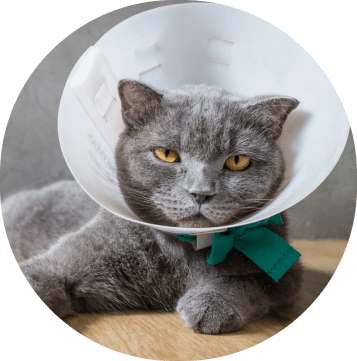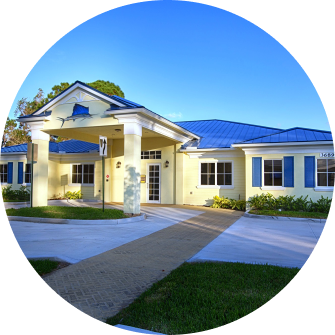
Neutering
Neutering is performed on male cats and dogs. This process castrates the animal, removing their testicles and making them unable to impregnate females. Neutering is advised when your pet is 4-6 months old but can be performed on older animals as well.
Benefits include:
- Placates the animal, reducing aggressive behavior and decreasing dominant tendencies
- Reduces roaming and spraying (territory marking)
- Eliminates the risk of testicular and prostate tumors
Although less invasive than spaying, neutering is still a major medical procedure that requires some recovery time. Recovery may also include pain medication and lethargy is common for the first couple days following the procedure. It’s extremely important that you monitor your pet to prevent the animal from licking or biting the incision to reduce the risk of infection.
Spaying
Spaying (ovariohysterectomy) is a common surgical procedure performed on female cats and dogs and involves removing the patient’s uterus, ovaries and fallopian tubes, rendering the animal incapable of reproduction. Stuart Sound Animal Hospital veterinarians recommend spaying your pet at 3-6 months, depending on your dog’s breed and ideally before the patient’s first heat.
Benefits include:
- Prevents unwanted pregnancies
- Eliminates the risk of ovarian and uterine tumors
- Remove the possibility of uterine infections
Spaying is a major surgery requiring 7-10 days of recovery time. Recovery may also include pain medication and lethargy is common for the first couple days following the procedure. A small, green tattoo is applied post-surgery that signifies that the animal is spayed should she ever get lost or taken to a shelter.
Anesthesia
Pain Management and Control
Just like people, pets can suffer lingering effects and discomfort from injury or a surgical procedure.
Stuart Sound Animal Hospital takes treating pain seriously and offers several options to help pets feel better, including medication and alternative therapies. We’ll develop a pain management program that’s customized for your pet’s condition and needs.
Patient Monitoring
Many pet parents are concerned when their pets haver surgery or another procedure that requires anesthesia.
As always, your pet’s safety and comfort is our main priority. While there is some degree of risk with any medical procedure, we utilize the safest available anesthetics and require pre-operative blood testing to ensure that your pet is healthy enough to undergo anesthesia.
We closely monitor all vitals to make sure your pet is safe and unharmed while he or she is under anesthesia, including heart activity, ECG, blood pressure, oxygen saturation, respiratory system, and temperature.
In addition, our experienced medical team provides skilled pain management during and after all surgical procedures, to see that your pet recovers quickly and with minimum discomfort.
General Anesthesia
General anesthesia is what is often referred to “putting someone under.” While we understand that many pet parents become nervous when they hear the word “anesthesia,” we can assure you that our highly trained and experienced team takes every precaution to protect your best friend prior to, during, and after anesthesia.
Before administering general anesthesia, we will, of course, conduct a thorough physical exam and the requisite bloodwork to determine that your pet is healthy enough to be put under.
Once your pet is cleared for anesthesia, he or she will be injected with a short-acting agent that leads to a loss of consciousness. We then insert a soft plastic tube into your pet’s windpipe through which oxygen and other gasses will flow. Anesthetized pets and their vital signs are monitored constantly during any and all procedures so that, in the unlikely event of an adverse reaction, we can respond to it immediately.
Have questions about general anesthesia prior to your pet’s appointment? Don’t hesitate to give us a call at (772) 287-0024.
Local Anesthesia
Local anesthesia refers to the one-time injection of medication meant to numb a particular area of your pet’s body. We might employ “a local” when giving your pet stiches or performing a biopsy or bone repair.
In contrast to general anesthesia, your pet will be awake the entire time, and, while he or she might feel some pressure at the injection site, there should be no significant pain or discomfort. Side effects are very rare and usually mild.
Our surgeons have experience in both procedures and will consult with you about the preferred method for your pet. The best surgical option for your dog will generally depend on size and age. To learn more about our surgery offerings or to schedule a consultation, give us a call at (772) 287-0024.


